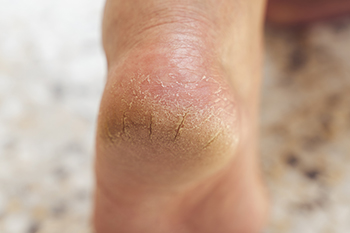 Cracked heels, medically known as keratoderma, is a condition where the skin on the heels becomes thick, dry, and eventually splits. This often painful issue arises from prolonged pressure on the feet, leading to hard, callused skin that can fissure. Causes include standing for long periods, wearing open-backed shoes, and exposure to dry, cold weather. Medical conditions like diabetes and hypothyroidism also contribute by causing excessively dry skin. Excessive weight increases pressure on the heel pads, further worsening the problem. Preventing keratoderma involves regular moisturizing, wearing supportive, closed-back footwear, and avoiding prolonged standing on hard surfaces. Proper foot care routines, including gentle exfoliation and hydration, are essential to maintain soft, healthy skin and prevent the discomfort associated with cracked heels. This condition can be painful. If this applies to you, it is suggested that you visit a podiatrist who can effectively treat cracked heels, which often includes prescribed medication.
Cracked heels, medically known as keratoderma, is a condition where the skin on the heels becomes thick, dry, and eventually splits. This often painful issue arises from prolonged pressure on the feet, leading to hard, callused skin that can fissure. Causes include standing for long periods, wearing open-backed shoes, and exposure to dry, cold weather. Medical conditions like diabetes and hypothyroidism also contribute by causing excessively dry skin. Excessive weight increases pressure on the heel pads, further worsening the problem. Preventing keratoderma involves regular moisturizing, wearing supportive, closed-back footwear, and avoiding prolonged standing on hard surfaces. Proper foot care routines, including gentle exfoliation and hydration, are essential to maintain soft, healthy skin and prevent the discomfort associated with cracked heels. This condition can be painful. If this applies to you, it is suggested that you visit a podiatrist who can effectively treat cracked heels, which often includes prescribed medication.
Cracked heels are unsightly and can cause further damage to your shoes and feet. If you have any concerns, contact Robert Hutchison, DPM, FACFAS from Lower Keys Foot & Ankle Surgery. Our doctor can provide the care you need to keep you pain-free and on your feet.
Cracked Heels
Cracked heels appear unappealing and can make it harder for you walk around in sandals. Aside from looking unpleasant, cracked heels can also tear stockings, socks, and wear out your shoes. There are several methods to help restore a cracked heel and prevent further damage.
How Do You Get Them?
Dry skin is the number one culprit in creating cracked heels. Many athletes, walkers, joggers, and even swimmers suffer from cracked heels. Age and skin oil production play a role to getting cracked heels as well.
Promote Healing
Over the counter medicines can help, especially for those that need instant relief or who suffer from chronic dry feet.
Wear Socks – Wearing socks with medicated creams helps lock in moisture.
Moisturizers – Applying both day and night will help alleviate dryness which causes cracking.
Pumice Stones – These exfoliate and remove dead skin, which allows for smoother moisturizer application and better absorption into the skin.
Change in Diet
Eating healthy with a well-balanced diet will give the skin a fresh and radiant look. Your body responds to the kinds of food you ingest. Omega-3 fatty acids and zinc supplements can also revitalize skin tissue.
Most importantly, seek professional help if unsure how to proceed in treating cracked heels. A podiatrist will help you with any questions or information needed.
If you have any questions, please feel free to contact our office located in Key West, FL . We offer the newest diagnostic and treatment technologies for all your foot care needs.
